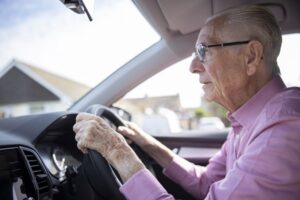Is It Time to Take Away the Keys?

Is It Time to Take Away the Keys?
The ability to drive a motor vehicle can be an important part of independence and mobility for older adults. Driving gives us a sense of autonomy that we feel from the first time we are handed a license as a teenager. But not all of us will be able to drive safely for the rest of our lives. Aging brings about physical and mental changes that can affect our ability to drive. Asking a loved one to voluntarily give up driving is often a difficult conversation. How do we know when to hang up the keys?
Driving is particularly dangerous for older adults. While younger drivers are more likely to cause a motor vehicle collision, older drivers are more likely to be injured or killed in an accident. Lower bone density, reduced muscle mass, and frailty are all factors that contribute to a higher rate of motor vehicle accident injury for older adults.
And complicating matters: Older adults are usually driving older cars. Studies have shown that older adults are more likely to be driving cars that are, on average, 16 years old. Unfortunately, some of those cars will lack the safety features of newer vehicles, such as side-impact air bags, mandatory back-up cameras, electronic stability controls or collision avoidance systems.
Older drivers are also more likely to be distracted drivers. Driving takes physical exertion and mental skill—something that becomes more difficult as we get older. A 2023 study from the University of California, Riverside found that older adults are more prone to distraction in these circumstances.
“As we engage in these physical activities, very often we simultaneously engage in cognitive tasks where distractors—a billboard or a car sales commercial on the radio—may be present,” said graduate student Lilian Azer, author of the research paper published in the journal Psychology and Aging. “Our study found that in comparison to younger adults, older adults are less likely to ignore distractors in their surroundings. Ignoring task-irrelevant items declines with age and this decline is greater when simultaneously performing a physical task—a frequent occurrence in daily life.”
Medical issues can also contribute to an unsafe driving environment for older adults.
- Hearing issues: Deaf people can and do drive. There are even laws in some states that prohibit licensing entities from denying people a driver’s license based on auditory issues alone. But it is worth considering how well your older loved one can rely on their eyesight and other reflexes if they also have hearing issues.
- Cognitive decline: Driving with dementia is a complicated issue, because the disease starts with mild cognitive impairment. But driving a motor vehicle involves a complicated set of rapid decision-making and quick reactions. When cars are involved, an error in judgement can be deadly.
- Medication side effects: The older a person is, the more likely they are to be taking one or more medicines that could have any number of side effects. Drowsiness, dizziness, confusion, and vertigo are all side effects of medication that could affect a person’s ability to drive.
Have the conversation
Yes, it could be awkward. Yes, your parent or loved one may be upset with you. But these things pale in comparison to what could happen if your older loved one got into an accident and hurt themselves—or someone else.
Try flipping the script. Your older loved one is losing one thing but gaining so much more! While most older people are long past making car payments, the gasoline, maintenance, and insurance costs of operating a vehicle are significant. Your loved one could turn those expenses into a fund for things that bring them joy, such as art supplies, movie rentals, or even a furry friend to be their companion at home!
Offer them options. Giving up driving doesn’t mean your loved one will be homebound. While not all homes are accessible via mass transit or taxicabs, every state has home care agencies that often offer transportation services. Para-transit services are available for people who can’t otherwise access public transportation. Private transportation services can assist older adults with a “door-to-door” approach that offers help getting in and out of a car and handling baggage.
With a thoughtful approach, you may be able to convince your loved one that it would be safer for them to stop driving while still living a full and independent life.
Source: IlluminAge AgeWise
![Guiding Care [logo]](https://www.guidingcarefl.com/wp-content/uploads/sites/361/2021/05/logo.png)